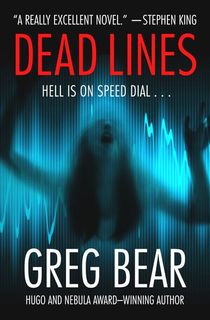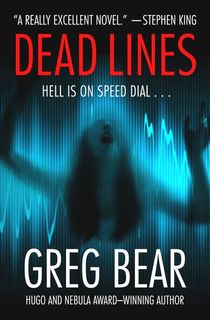Technology has come a long way, but where’s the line? How much “revolutionary technology” is too much?
In Dead Lines, Peter Russell hasn’t been the same since his daughter was kidnapped and murdered. With a now-stagnant career, things start looking up when a start-up company asks him to create a promotional video for their new technology, Trans. Trans is a mobile communication device that claims to offer crystal-clear service, revolutionizing the modern cell phone.
But once Peter begins using the device, things take a turn for the worse. He starts seeing his murdered daughter and hearing strange voices all around him. And as the death toll of Trans-users exponentially increases, Peter must work to stop it before the floodgates to Hell open.
Read on for an excerpt from Dead Lines, and then download the book.
Something moved again in the hall, making not so much a distinct sound as a change in the volume of air. Now Peter was sure. Someone had come into the house while he was sleeping—not Phil, of course; a burglar. He reached into his pants pocket, feeling for the knife he sometimes kept there, and did not find it. It must have slipped out in the car or on the couch.
He pushed open the bathroom door with a—this time—deliberate bang and stepped into the hall, looking both ways. Dark left, dark right. “Whoever you are, get the hell out,” he called, hands clenched.
Peter had no tolerance for burglars. He had been robbed often enough—the house four times, his car three times. People who stole deserved no mercy as far as he was concerned.
He found an antique button switch and pushed it. The hall light came on. Empty. The door at the end of the hall, leading into Phil’s bedroom, was open just a crack. He stood for a moment, listening.
Someone crying. The sound could have come from outside, from another house. But there were no houses close enough, not here at the end of Hidden Dreams Drive. Peter could feel heat rising again behind his eyes, steamy. Tropical. Such a weird sensation.
He realized he was making little hiccuping gulps as he finished his walk toward the end of the hall, Phil’s bedroom. The door’s closing had been blocked by wire hangers hooked over the top. He was astonished by how clearly he saw everything in the light of the hall fixture: wallpaper pastel flowers in diamond patterns, dark-stained baseboards, antique oak floor, worn oriental-design runner rucked up and curling on one side, boxes on the left stacked almost to the ceiling, WEIRD TALES 1933–48, the bedroom door and the hangers again, the darkness beyond the crack.
It sounded like a woman crying, soft, silky sobs, voice like dusty honey. Not Phil, then, of course, and probably not a burglar. A lost little girl, maybe. Some out-of-it doper staggering around late at night. Peter forced his breath to slow. Maybe it was someone Phil knew, a lover come back to pick up her toothbrush, her underwear, her jewelry, as unlikely as that might be—Phil had kept so much to himself.
Peter assumed a fencer’s position in the hall, En garde. “I’m out here, and I won’t hurt you,” he said, hand outstretched. “Don’t be afraid. It’s okay.” He knew, could feel it as a tangible fact, that the bedroom was empty, but he could still hear the sobbing through the door.
Slender lines of darkness gathered in the periphery of his vision like smeared ink. As he tried to focus, they blended into corner shadows like wisps of spiderweb. Still, outside his direct gaze, the smudged lines flashed toward the bedroom door, wriggling like dark, blurry eels anxious to get in.
I’m having a stroke, just like Phil.
But he did not feel ill. Physically he was fine; it was the house, the bedroom, that was not fine.
It was the bedroom that was crying.
Peter was not a coward. He knew that about himself. He could feel fear and still act, but what he felt now was not fear; it was an unwillingness to learn, and that was very different. Some things that you discover—infidelity, the death of loved ones—you cannot turn back from. What you suddenly know changes you, chops you up into little pieces.
He did not want to learn what was in the bedroom.
Still, he poked the door open with a stiff finger. He leaned slowly into the bedroom and fumbled to push the button switch. The ceiling fixture slowly glowed to sterile yellow brightness. Shadows fled across the bedroom like little cyclones of soot.
Peter grabbed the doorjamb.

A woman stood at the foot of Phil’s bed. She had buried her face in gray hands, but Peter could tell who she was by the dark comma of bobbed hair and the honey-silk quality of her weeping. “My God,” he said, and his shoulders slumped. He let out his breath and started to smile. “Lydia. You scared me.”
The woman’s hands dropped. She turned, head cocked, listening; slowly turned and listened some more, as if to far-off and unpleasant music.
All of a sudden, through his relief, Peter’s tongue moved involuntarily, and he bit into it. His head exploded in pain. Eyes watering, gasping, he felt vulnerable and very, very foolish. Through his tears, he saw that the woman’s face was like a flat sheet of mother-of-pearl. Her eyes opened to quizzical hollows. Less than solid, she resembled a paper doll frayed by careless snipping. Peter could actually see her edges ripple. Trying to back out, he thumped against the door, closing it, and for an instant, felt something tug at his head, his throbbing tongue, his nerves.
Her blank and empty eyes vibrated. They seemed to point not quite in his direction, but through and beyond him. The image filled out like a balloon, assuming a counterfeit and temporary solidity.
Not Lydia. But it looks like her.
The image moved its lips. As if pushing through gelatin, the sound arrived late at his ears. “Phil, how could you do this, how could you just die?” came the high-pitched silken wail, only a little louder than the buzzing of a fly.
The eel shadows swooped through the door and into the bedroom like descending hawks. He could feel them brush his shoulders like the tips of cold, damp fingers. The figure jerked in a horrible simulation of fear, trying to escape, dodging faster than flesh, like a bad film edit. But escape was impossible.
Peter’s mouth went stone dry. He wanted to look away, block his vision with a hand. Instincts old and deep instructed him that he was about to bear witness to something private, a sight no living human should ever have to see; but he could not stop himself.
He stared. Pity held him. And curiosity.
The eel shadows swarmed and lanced and worried the image, snatching away scalloped bites and crumbling pieces. It lifted its hands in weak defense, shuddering with an astonishing, dry simulacrum of pain. Whatever it was, its time had come. As the likeness of Phil’s ex-wife diminished and deflated, its wailing turned tinny and desperate. It unraveled drastically, peeling and dissolving in shreds like a tissue-paper cutout dipped in a bowl of water. In a few seconds, the last of its murky outline disintegrated and fell away. Sated, the shadows fled, draining like water around his feet. The room seemed to shiver off the last of them, leaving just the bed, neatly made and undisturbed, and the threadbare carpet and empty shelves.
The image, the delusion, the reflection or copy of Lydia—whatever it might have been—was gone. Peter leaned his shoulder against the doorjamb. He could not move. For the moment, he could not even turn his head. Blood pounded in his ears. His calf cramped and he gritted his teeth. Even in his worst days of besotted grief, he had never seen anything remotely like this.
Pitiful, something left behind, dropped like an old Kleenex.
His heart slowed. The heat behind his eyes cooled. Finally, he had to blink. That instant with his eyes closed terrified him and he felt his neck tense and intestines curl.
Nothing came. Nothing touched him. Quiet and still. The room was innocent.
Nothing had actually happened.
Nothing real.
Peter was finally able to turn. He put out one foot as if rediscovering how to walk, then another, and slowly left the bedroom, reaching back with numb and inept fingers to close the door. The hangers caught. He could not close the door all the way, so he angrily slammed it. The hangers jangled. One fell and bounced off the wood floor with a tinny resonance. The whine of the hanger wire made him grit his teeth; it sounded too much like the voice.
He gave up and walked on what felt like tingling stumps to the couch in the living room. Sat on the couch with hands folded on his lap. Did not even try to relax. Watched the carnival of the city across the water, darker now in the wee hours. His neck knotted and stayed that way.
He was still alive and wasn’t sure he wanted to be, not if he had to think about what he had just seen.
Want to keep reading? Download Dead Lines now.
This post is sponsored by Open Road Media. Thank you for supporting our partners, who make it possible for The Portalist to continue publishing the out-of-this-world stories you love.
Middle photo: Steinar Engeland / Unsplash


